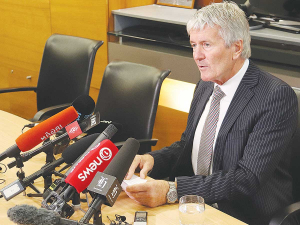Damien O’Connor: NZ united on global trade
When it comes to international trade, politicians from all sides of the aisle are united, says Labour's trade spokesman Damien O'Connor.
 Agriculture Minister Damien O'Connor fronting at a media conference last week to announce the Government's impending ban on live animal exports.
Agriculture Minister Damien O'Connor fronting at a media conference last week to announce the Government's impending ban on live animal exports.
Concerns about the threat posed to New Zealand's trading reputation by live animal exports from this country have led to a move to shut down the trade.
Agriculture Minister Damien O'Connor gave this as the main reason for the Government's decision to ban all livestock exports from NZ, within two years, at an announcement last week.
He says live cattle exports from NZ has been a feature of the country's farming system for a long time and despite banning exports of livestock for slaughter in 2008, problems had not gone away.
Figures show that the number of cows exported overseas - mainly to China - since 2010 has risen from just over 26,000 to over 113,000 last year.
O'Connor says a number of reviews have been conducted into this trade, including one following the sinking of the Gulf Livestock 2 in 2020. He says the independent National Animal Welfare Advisory Committee recommended the trade stop.
"Over recent years, we have seen some reports that many of the ships carrying livestock are not designed for live exports and where conditions have led to adverse welfare outcomes," he claimed. "The fact is that once animals leave NZ by sea, we have very little ability to ensure their wellbeing before they reach their destination and that is an unacceptable risk for us."
O'Connor claims at the heart of the decision is upholding NZ's reputation for high standards in animal welfare. He says "we must stay ahead of the curve in a world where animal welfare is under increasing scrutiny."
He says the Chinese government was advised about the decision before the public announcement - as was Australia. But O'Connor emphasised that the issue was about animal welfare and not China.
"As an industry, across the sector, we are moving from volume to value and this area of animal welfare is one we have to move on to ensure we are fully compliant - not just on farm but in any transport issue," O'Connor added.
"I recognise the importance of our trade relationships with our international partners and we're committed to working with them as we transition away from the shipment of livestock. We have an opportunity to boost trade through our cutting-edge scientific work into dairy cow genetics and germplasm use."
Two Year Transition
Damien O'Connor says he appreciates that there is an existing live export trade and that some people have made a significant investment in it.
This is why there is a two year maximum transition period, so that people can wind down the trade and adjust their operations.
"This is a complex process to unwind, so the final exact length of the transition period will be determined pending further advice from MPI," O'Connor added. "I have also asked them (MPI) to provide advice on possible improvements to animals on ships during the transition period."
O'Connor accepts that during the transition period there is a risk, but says everything possible will be done to mitigate any such risks.
He claims the transition period will give those farmers affected by the ban time to adjust their operations and work out what to do with animals they are currently sending overseas.
O'Connor noted that the shipment of livestock by air (a very miniscule number) is not affected by the ban because he claims the travel times are shorter and generally the animals are well looked after.
Dairy Women's Network (DWN) has announced that Taranaki dairy farmer Nicola Bryant will join its Trust Board as an Associate Trustee.
Rural Women New Zealand (RWNZ) says it welcomes the release of a new report into pay equity.
Red meat exports to key quota markets enjoyed $1.4 billion in tariff savings in the 2024-25 financial year.
Remediation NZ (RNZ) has been fined more than $71,000 for discharging offensive odours described by neighbours as smelling like ‘faecal and pig effluent’ from its compositing site near Uruti in North Taranaki.
Two kiwifruit orchards in the Bay of Plenty and one in Northland are this year's finalists for the Ahuwhenua Trophy competition.
The Government's chief science advisor, Dr John Roche says the key objective for the science sector in the coming year is bedding down the reforms which sees the merger of the previous entities.

OPINION: A mate of yours truly reckons rural Manawatu families are the latest to suffer under what he calls the…
OPINION: If old Winston Peters thinks building trade relations with new nations, such as India, isn't a necessary investment in…